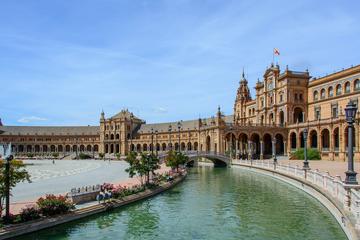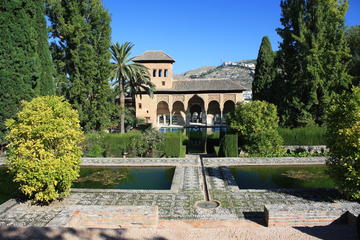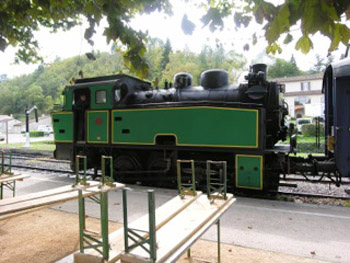
by Glen Cowley
Its long grey breath trailing in smoky gasps the iron dragon pushed its nose into the looming darkness of the beckoning mountain.
From Saint-Jean-du-Gard the Train Touriste a Vapeur des Cevennes wends it way through southern France’s Cevenne Mountains, the 13 winding kilometres to Anduze; burrowing its way through tunnels, leaping the River Gardon and hugging mountainsides. Nature’s vistas and mankind’s legacies explode into view with every turn and twist.
Since 1909 steam and diesel engines have been labouring through the Gardon Valley between Saint Jean and Anduze, their fortunes rising and falling with the vagaries of economies and technology. Saved from its demise by popular support the operation safely landed in community hands and has been running as a tourist train since 1982. Some 30,000 people a year board the period passenger cars and lurch into motion behind one of the six steam or diesel locomotives for the one way or return journey between the two towns.
 Our trip began with a short walk from the bus stop at Saint-Jean-du-Gard, treading the bridge over the historic Gardon River, to the the small square abutting the quaint train station. Our locomotive was already huffing and puffing in anticipation; its passengers choosing their carriages with puzzled analysis. Chatter proved easy between travellers and we struck up conversation with a gentleman from a small town in England who popped down to the south for a brief one week junket as he was wont to do on occasion.
Our trip began with a short walk from the bus stop at Saint-Jean-du-Gard, treading the bridge over the historic Gardon River, to the the small square abutting the quaint train station. Our locomotive was already huffing and puffing in anticipation; its passengers choosing their carriages with puzzled analysis. Chatter proved easy between travellers and we struck up conversation with a gentleman from a small town in England who popped down to the south for a brief one week junket as he was wont to do on occasion.
With a bump and grind and a huff and a puff we inched away from the station; the engine’s exertions gasping with smoking grunts. Nestling alongside the river our wending way took us through pastoral fields overlooked by low mountains shaded in greenery save where the greyish face of earth’s bones erupted or protruded; a sense of the tamed and the wild. Passengers poked noses out of windows to garner better views and gaze ahead at the engine snaking around the curves and bends. Viaducts spanned the lesser streams feeding into the Gardon, raising up vistas of the rising mountains as we passed. Houses, seemingly unassailable, peeked through the greenery. Just where the river broadened into an alluvial expanse the tunnel de la Salindrenque suddenly engulfed us in darkness, the echoes of the cars and the whiff of smoke invading our space. Heads pulled in to safety as we blindly felt the darkness pass.
Bursting into light we spanned a tributary and looked down upon the bony shores of the Gardon and its pure waters rushing beneath us. An old stone mill crowded the shoreline and bathers paused to watch our passing.
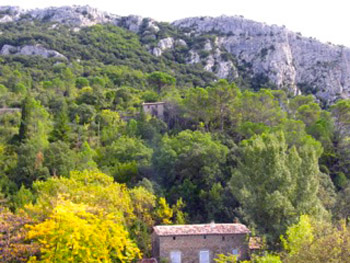 Slowly we ground to a halt for the Bambouseriae (Bamboo Garden) where those wishing to do so disembarked for a tour of this unique jungle that pulls in 150,000 visitors per year. The 10 hectare walk can eat up an hour and half easily so a visit takes some planning and scheduling. Fortunately the return trip comes through two hours later. From our perch high above the park we could espy the tangled canopy and winding trails.
Slowly we ground to a halt for the Bambouseriae (Bamboo Garden) where those wishing to do so disembarked for a tour of this unique jungle that pulls in 150,000 visitors per year. The 10 hectare walk can eat up an hour and half easily so a visit takes some planning and scheduling. Fortunately the return trip comes through two hours later. From our perch high above the park we could espy the tangled canopy and winding trails.
The two minute stop completed, those of us remaining aboard began the final, spectacular, advance upon the mountain guard of Anduze. A steep, white-faced escarpment rose dramatically to our left before we spun onto a tall, steel bridge over the Gardon and faced the looming visage of Mount Saint-Julien, rising almost a thousand feet above us. A mount once fortified during the Gallo-Roman and medieval periods. There was to be no long winding route around this singular natural edifice; we bore straight towards its rising body and the dark portal bespeaking the Tunnel d’Anduze. Swallowed into the blackness of the kilometre long tunnel we seemed to linger forever in the racing darkness until we were thrown blinking into the welcoming light and the easing lurch of our carriage to its Anduzian berth.
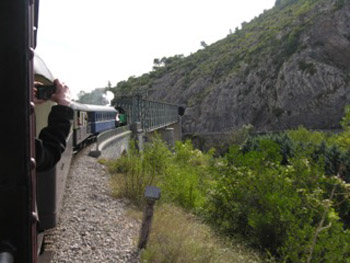 We were catching the bus back to Nimes from Anduze and so had leisurely time to explore this historical gateway to the Cevennes. For those taking the train back they had time for at least a quick stroll about town. Home to a population of 3000, down from its formative years, the Anduze area has evidence of habitation from prehistoric times and was a Gallo-Roman settlement. Here, in the 10th century, the Siegneurie of Anduze was established.
We were catching the bus back to Nimes from Anduze and so had leisurely time to explore this historical gateway to the Cevennes. For those taking the train back they had time for at least a quick stroll about town. Home to a population of 3000, down from its formative years, the Anduze area has evidence of habitation from prehistoric times and was a Gallo-Roman settlement. Here, in the 10th century, the Siegneurie of Anduze was established.
The tourism office is located in the main town square amply bordered by a ring of cafe’s tempting with coffee, cool beer, wine or treats (remembering, of course that wine is considered a food). The office, housed in one of the largest former temples in France (built between 1820 and 1823), an impressive structure dominating the square, provides a handy English language map of Anduze. The bus stop is but a peek around the corner away.
Small though it may be Anduze is no less a treat to the eye than any other southern French town and much is within an easy walk-about range. Central to the square rises the unique Tour de L’Horloge (clock tower) dating from 1320. Replete with a sundial, bell and proud Gallic rooster it managed to survive the destruction of the town’s ramparts in 1629.
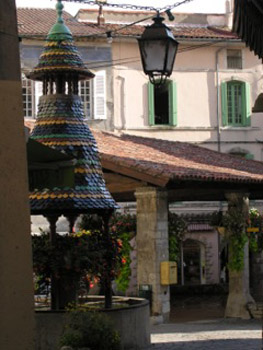 Anduze and its area was long a Protestant holdout during the terrible religious wars of France and suffered for it.
Anduze and its area was long a Protestant holdout during the terrible religious wars of France and suffered for it.
Fountains and squares abound. The Fountain Pagoda speaks to the unique evolution of the silk industry here. Built in 1648 in an eastern fashion it was funded by an Anduzian trader who had brought the industry here from Asia. Perhaps less profound but no less intriguing are the Fountain of the Bicenterary built in 1989 to celebrate the revolution, the Pradier Fountain, the Fountain of the Bridge and the Fountain of the Potters. Word is that there were even more fountains dating from the early 18th century but some were sacrificed to urban modernization.
Thursday morning markets are still housed in the covered market place originally constructed in 1457.
There is no concealing the heavy hand of tourism here yet like the stone construction of its buildings Anduze seems well able to absorb the tidal wash of its many visitors and emerge intact every morning.
We found our English counter part nursing a beer at a cafe; pausing to chat about our discoveries. So engaged we heard a whistle echo against the mountains. We listened as it trailed away into the bowels of mount Saint Julien, glad we had heard its song.
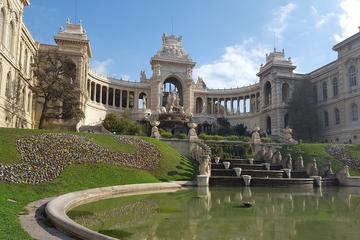
Marseille Shore Excursion: City Half-Day Sightseeing Tour of Marseille
If You Go:
♦ www.trainavapeur.com – webpage for the steam train. It runs daily from April 1 to August 31 then until November for 5 to 6 days a week. An adult return fare was 11 Euros and a child’s was €7.50. One way takes 40 minutes.
♦ www.map-france.com/saint-jean-du-gard-30270 – website for Saint-Jean-du-Gard
♦ www.beyond.fr/villages/anduze.html – website for Anduze
♦ www.bambouseraie.com – website for the Bambo Garden
About the author:
Since 1994 Glen Cowley has parlayed his interest in sports, travel and history into both books and articles. The author of two books on hockey and over fifty published article (including sports, biographies and travel) he continues to explore perspectives in time and place wherever his travels take him. From the varied landscapes of British Columbia to Eastern Canada and the USA, the British Isles, Germany, Switzerland, the Netherlands, Greece and France he has found ample fodder for features.
All photos are by Glen Cowley.


 The rich history of Málaga goes as far back as the 8th century BCE when the Phoenicians founded the trade settlement here they named Malacca. The name is derived from the Punic, malac meaning ‘salt’, as Málaga was founded as a fish-salting settlement. The Phoenicians, Greeks, Romans, Visigoths, and Moors all left their mark here and throughout the centuries, Málaga continued to thrive as a chief settlement and established harbor. Today, the port of Málaga stands as the second largest in Spain after Barcelona.
The rich history of Málaga goes as far back as the 8th century BCE when the Phoenicians founded the trade settlement here they named Malacca. The name is derived from the Punic, malac meaning ‘salt’, as Málaga was founded as a fish-salting settlement. The Phoenicians, Greeks, Romans, Visigoths, and Moors all left their mark here and throughout the centuries, Málaga continued to thrive as a chief settlement and established harbor. Today, the port of Málaga stands as the second largest in Spain after Barcelona. The first time I landed at the Pablo Picasso International Airport, I was pleasantly surprised by the display of reproductions of the Málaga-born artist that adorned the walls of the corridor of Terminal T2 known as Pablo Ruiz Picasso. Art-lovers can visit the Museo Picasso Málaga located in the city center dedicated to exhibiting over 200 of his works. At the nearby Plaza de la Merced, stands the birthplace or Casa Natal where the famous artist was born in 1881. Just over a century later, it was declared an official heritage site and today, it stands as a foundation promoting his works.
The first time I landed at the Pablo Picasso International Airport, I was pleasantly surprised by the display of reproductions of the Málaga-born artist that adorned the walls of the corridor of Terminal T2 known as Pablo Ruiz Picasso. Art-lovers can visit the Museo Picasso Málaga located in the city center dedicated to exhibiting over 200 of his works. At the nearby Plaza de la Merced, stands the birthplace or Casa Natal where the famous artist was born in 1881. Just over a century later, it was declared an official heritage site and today, it stands as a foundation promoting his works. Although, I am not a fan of the sport, I decided to visit at a time when no bullfights were scheduled. I ventured out into the vast bullring and I have to admit that it was quite impressive and strangely peaceful. After a few minutes, I noticed two young boys in the middle of the ring who were practicing or training to become bullfighters or matadors. The boys had cleverly attached what looked like set of horns to a type of cart that was wheeled by one boy as he constantly rammed his way towards the other who was gracefully dodging and darting his way, almost as if dancing, while maneuvering his cape. I smiled and thought to myself that I much rather preferred to have seen this than an actual bullfight!
Although, I am not a fan of the sport, I decided to visit at a time when no bullfights were scheduled. I ventured out into the vast bullring and I have to admit that it was quite impressive and strangely peaceful. After a few minutes, I noticed two young boys in the middle of the ring who were practicing or training to become bullfighters or matadors. The boys had cleverly attached what looked like set of horns to a type of cart that was wheeled by one boy as he constantly rammed his way towards the other who was gracefully dodging and darting his way, almost as if dancing, while maneuvering his cape. I smiled and thought to myself that I much rather preferred to have seen this than an actual bullfight!
 A 10-minute walk from the wine museum will take you to the magnificent Roman and Moorish vestiges located in the eastern part of the city. The Moorish structures include the 11th century fortress or Alcazába and the 14th century Gibralfaro Castle; both built by the Moors over Roman ruins upon a hill overlooking the city and harbor. The Alcazába is considered as one of the best preserved Moorish fortresses in the country. The fortress once stood as the royal residence of Sultans and today stands as a true landmark of the city adorned with Caliphal arches, majestic courtyards, tiled patios, look-out towers, and jasmine-scented gardens. Ornamental fountains and pools decorate the tranquil grounds leaving one with a sense of peace from the soothing sounds of trickling water that can be heard throughout the grounds as is customary to Muslim tradition.
A 10-minute walk from the wine museum will take you to the magnificent Roman and Moorish vestiges located in the eastern part of the city. The Moorish structures include the 11th century fortress or Alcazába and the 14th century Gibralfaro Castle; both built by the Moors over Roman ruins upon a hill overlooking the city and harbor. The Alcazába is considered as one of the best preserved Moorish fortresses in the country. The fortress once stood as the royal residence of Sultans and today stands as a true landmark of the city adorned with Caliphal arches, majestic courtyards, tiled patios, look-out towers, and jasmine-scented gardens. Ornamental fountains and pools decorate the tranquil grounds leaving one with a sense of peace from the soothing sounds of trickling water that can be heard throughout the grounds as is customary to Muslim tradition. The Gibralfaro Castle is actually older than the Alcazába as it dates to the 10th century, however, it was during the 14th century when it was rebuilt and enlarged in order to protect the Alcazába that was otherwise vulnerable to attacks approaching from the hills. During the days of Muslim rule, the sea reached all the way to what once were the lower ramparts. Today, spectacular views of the city, bullring, and port can be appreciated from the Gibralfaro Castle.
The Gibralfaro Castle is actually older than the Alcazába as it dates to the 10th century, however, it was during the 14th century when it was rebuilt and enlarged in order to protect the Alcazába that was otherwise vulnerable to attacks approaching from the hills. During the days of Muslim rule, the sea reached all the way to what once were the lower ramparts. Today, spectacular views of the city, bullring, and port can be appreciated from the Gibralfaro Castle.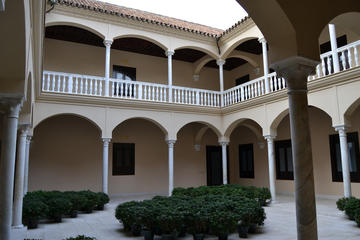
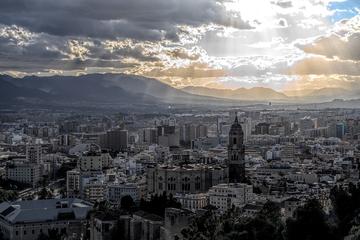

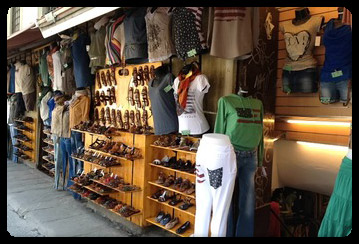
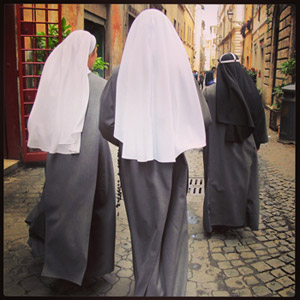 I am amused and entertained by the wooing of passersby that ensues, the waltz of gestures and pivots, the come-hither looks. Economic casualty aside, I presume the pride of owning an un-Burberry outweighs the pesky oppression of jail. Yesterday, I watched as they installed themselves in front of the Prada store, selling fake Prada bags. Some laugh, some applaud, I cringe.
I am amused and entertained by the wooing of passersby that ensues, the waltz of gestures and pivots, the come-hither looks. Economic casualty aside, I presume the pride of owning an un-Burberry outweighs the pesky oppression of jail. Yesterday, I watched as they installed themselves in front of the Prada store, selling fake Prada bags. Some laugh, some applaud, I cringe.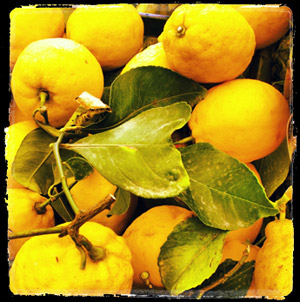 Rashid tells me he came from Marrakesh a couple of years ago. He is 25 and comes every day to the Palazzo Vecchio to surreptitiously sell cheap posters depicting iconic artworks hanging in Italian museums. With knitted brow and eyes cast to the clouds, he proceeds to say that on a good day he’ll sell 10 or 20 at five euros each. He leans in closer and whispers to me, proudly, his biggest seller is Botticelli’s ‘Primavera’.
Rashid tells me he came from Marrakesh a couple of years ago. He is 25 and comes every day to the Palazzo Vecchio to surreptitiously sell cheap posters depicting iconic artworks hanging in Italian museums. With knitted brow and eyes cast to the clouds, he proceeds to say that on a good day he’ll sell 10 or 20 at five euros each. He leans in closer and whispers to me, proudly, his biggest seller is Botticelli’s ‘Primavera’.
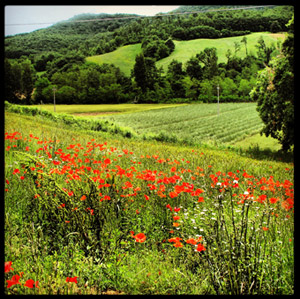 I learn the real David, though housed in a quiet museum, has been attacked a few times, recently by a hammer-wielding fanatic. It was repaired by marble restorers, so is it disqualified from being truly real?
I learn the real David, though housed in a quiet museum, has been attacked a few times, recently by a hammer-wielding fanatic. It was repaired by marble restorers, so is it disqualified from being truly real?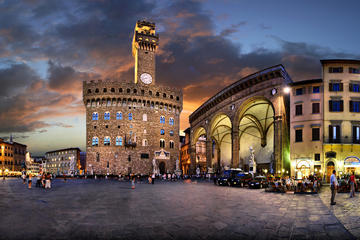
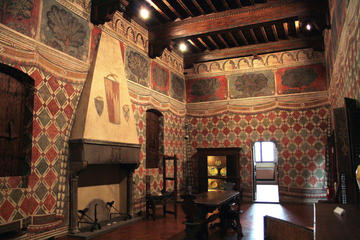
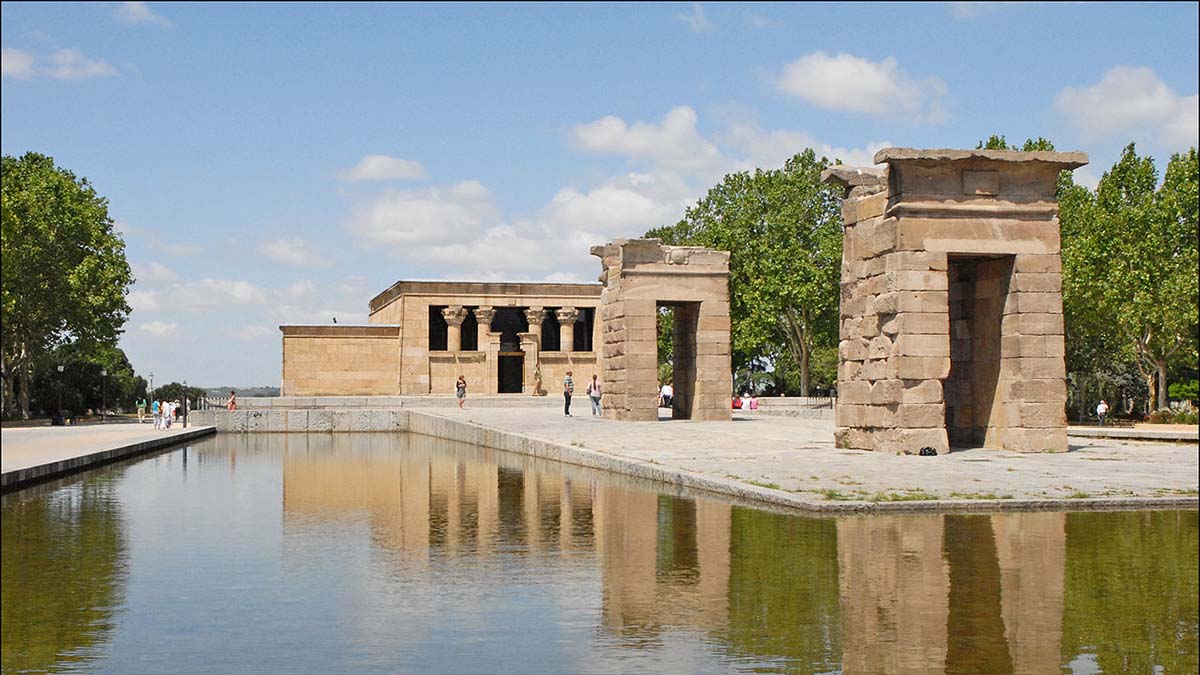
 Originally, the Temple of Debod stood on the right bank of the River Nile, just above the First Cataract near Aswan, dedicated to the god Amun and the goddess Isis. In 1898, the British, who then controlled Egypt, decided to dam the Nile at Aswan, the work being completed in 1902. With typical short-sightedness, they completely disregarded the fact that some important monuments would be lost beneath the surface of the resulting lake … including the beautiful Temple of Isis on Philae Island, and the not-so-well regarded Temple of Debod nearby.
Originally, the Temple of Debod stood on the right bank of the River Nile, just above the First Cataract near Aswan, dedicated to the god Amun and the goddess Isis. In 1898, the British, who then controlled Egypt, decided to dam the Nile at Aswan, the work being completed in 1902. With typical short-sightedness, they completely disregarded the fact that some important monuments would be lost beneath the surface of the resulting lake … including the beautiful Temple of Isis on Philae Island, and the not-so-well regarded Temple of Debod nearby.
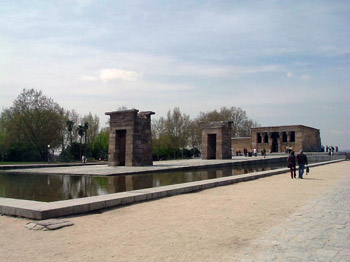 Immediately on boarding the boat above the Aswan Dam, the popular concept of modern Egypt was left behind. There’s only the boat, the lake and the temples … and tranquil, unhurried peace. On the way to Abu Simbel, the boat calls at the Kalabsha Temple site, Wadi el Seboua and the Amada Temples, all of which were rebuilt above the waters of the lake.
Immediately on boarding the boat above the Aswan Dam, the popular concept of modern Egypt was left behind. There’s only the boat, the lake and the temples … and tranquil, unhurried peace. On the way to Abu Simbel, the boat calls at the Kalabsha Temple site, Wadi el Seboua and the Amada Temples, all of which were rebuilt above the waters of the lake.
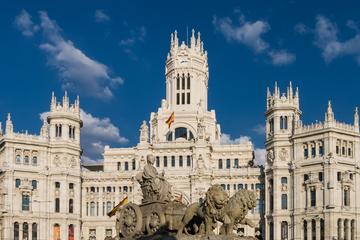
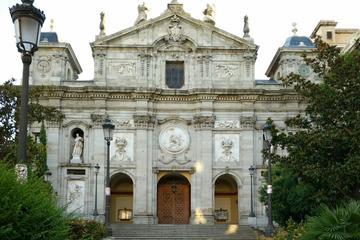
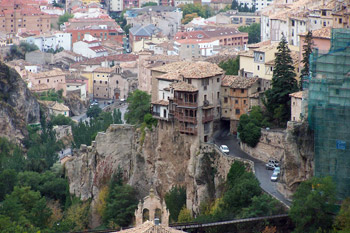
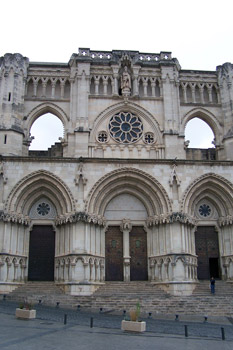 The hanging houses are the draw to this remote city but the old part of town itself is worth exploring. We take a short walk downhill from a lookout point to the Plaza Mayor where the Cuenca Cathedral is located. Dating from 1177, the building is impressive with its three arches. The Gothic Anglo-Norman façade is the only one of its kind in Spain with construction on the cathedral continuing for 300 years and never quite completed. I enjoy wandering the medieval cobblestone streets that wind past old stone houses, adorned with colorful plants spilling over the balconies and climbing up stairways.
The hanging houses are the draw to this remote city but the old part of town itself is worth exploring. We take a short walk downhill from a lookout point to the Plaza Mayor where the Cuenca Cathedral is located. Dating from 1177, the building is impressive with its three arches. The Gothic Anglo-Norman façade is the only one of its kind in Spain with construction on the cathedral continuing for 300 years and never quite completed. I enjoy wandering the medieval cobblestone streets that wind past old stone houses, adorned with colorful plants spilling over the balconies and climbing up stairways.
 We spend the night at Hotel Cueva del Fraile or The Cave of Friars, an enchanting place seven kilometers up the road. This 16th century building hidden in the rugged mountains was once a monastery (for the devout), later a workhouse (for the poor) and now a luxury place of refuge (for the weary traveler). I get lost finding my room as I wander the myriad of stairs and hallways, which only adds to the charm. The structure has stayed true to its original construction and surrounds a peaceful courtyard. The rooms, with high ceilings, thick stone walls and wooden beams, have no doubt been made more comfortable since the days of the friars. Antiques depicting former times are found throughout the building. The hotel restaurant features delicious, authentic Castilian cuisine for dinner and breakfast. It’s impossible for me to resist the thick, creamy hot chocolate and chocolate filled croissants on offer. Staying at Cueva del Fraile is a memorable experience for someone with an overactive imagination. Rumour has it that there is even a hotel spook!
We spend the night at Hotel Cueva del Fraile or The Cave of Friars, an enchanting place seven kilometers up the road. This 16th century building hidden in the rugged mountains was once a monastery (for the devout), later a workhouse (for the poor) and now a luxury place of refuge (for the weary traveler). I get lost finding my room as I wander the myriad of stairs and hallways, which only adds to the charm. The structure has stayed true to its original construction and surrounds a peaceful courtyard. The rooms, with high ceilings, thick stone walls and wooden beams, have no doubt been made more comfortable since the days of the friars. Antiques depicting former times are found throughout the building. The hotel restaurant features delicious, authentic Castilian cuisine for dinner and breakfast. It’s impossible for me to resist the thick, creamy hot chocolate and chocolate filled croissants on offer. Staying at Cueva del Fraile is a memorable experience for someone with an overactive imagination. Rumour has it that there is even a hotel spook!